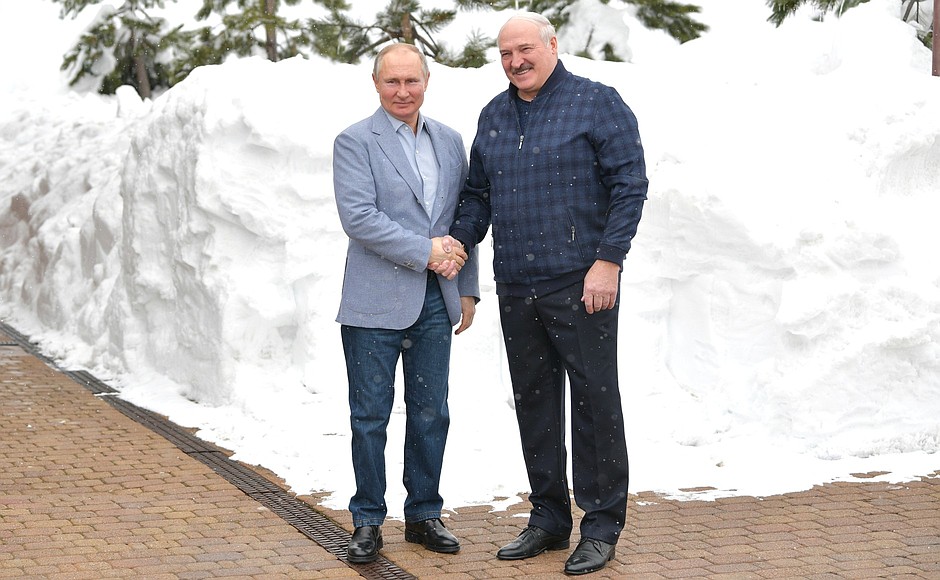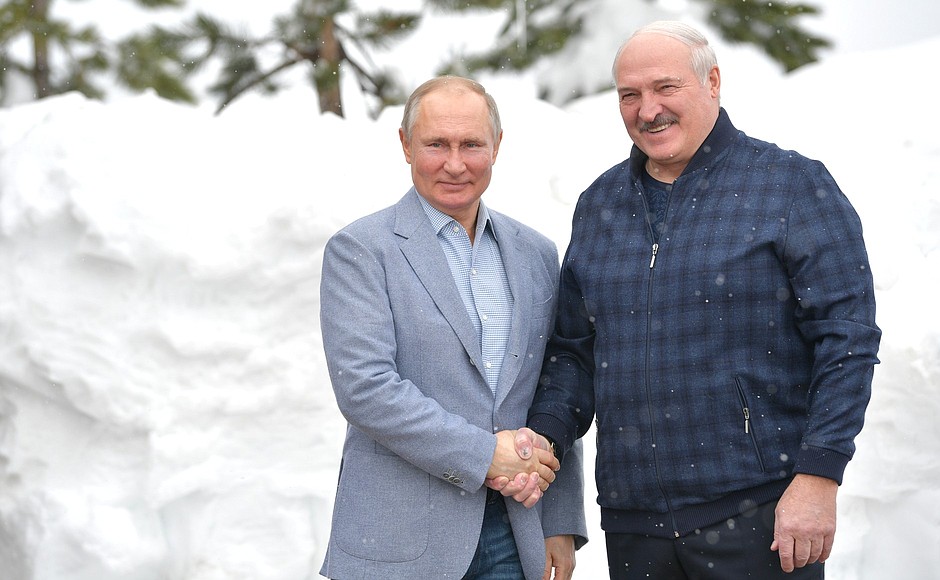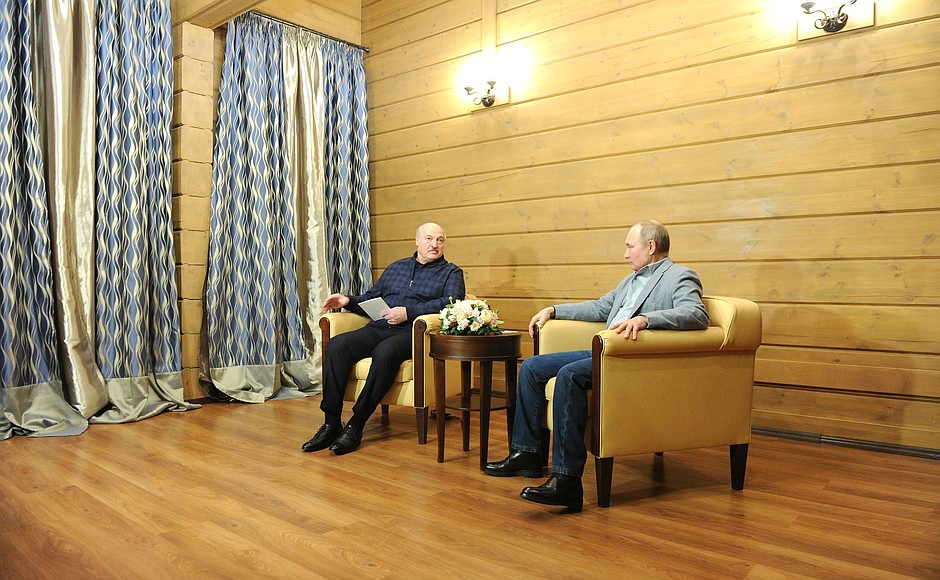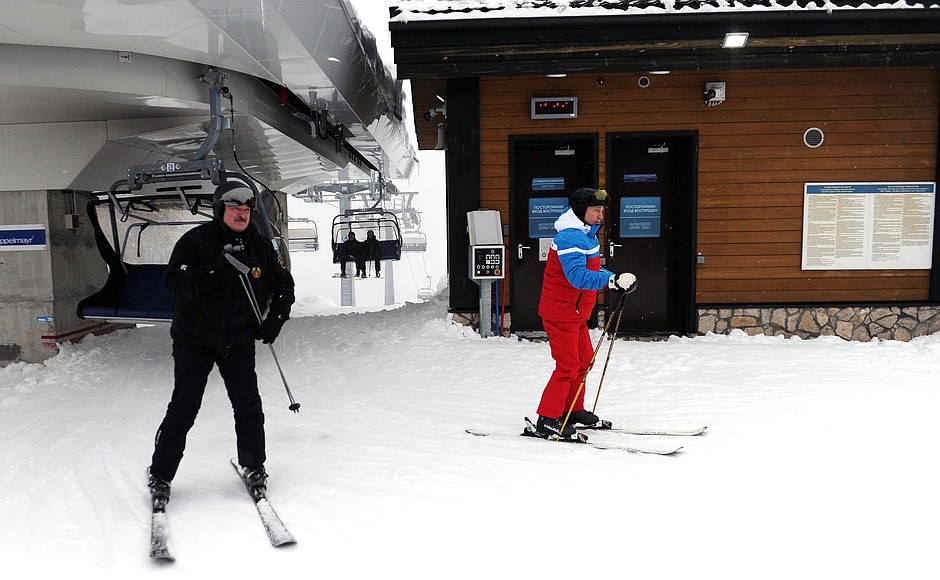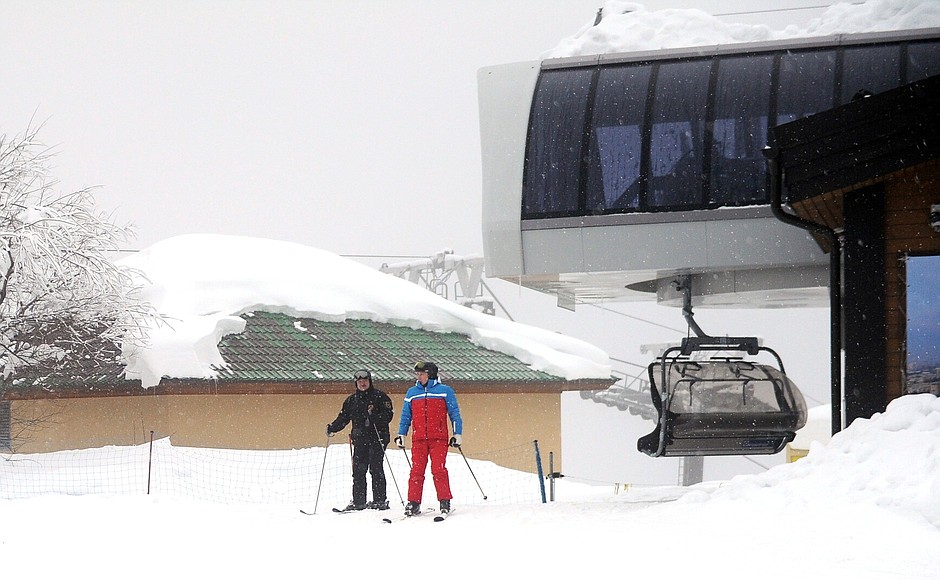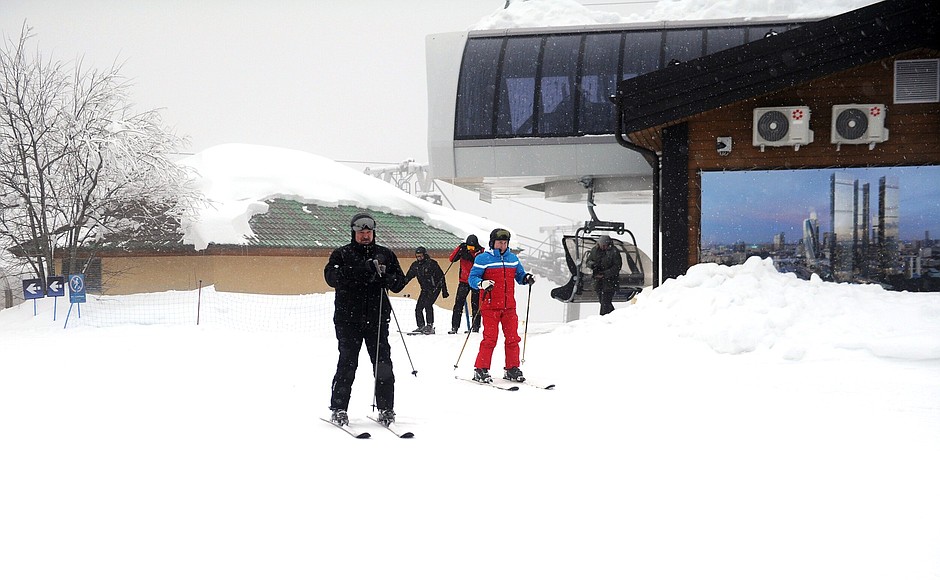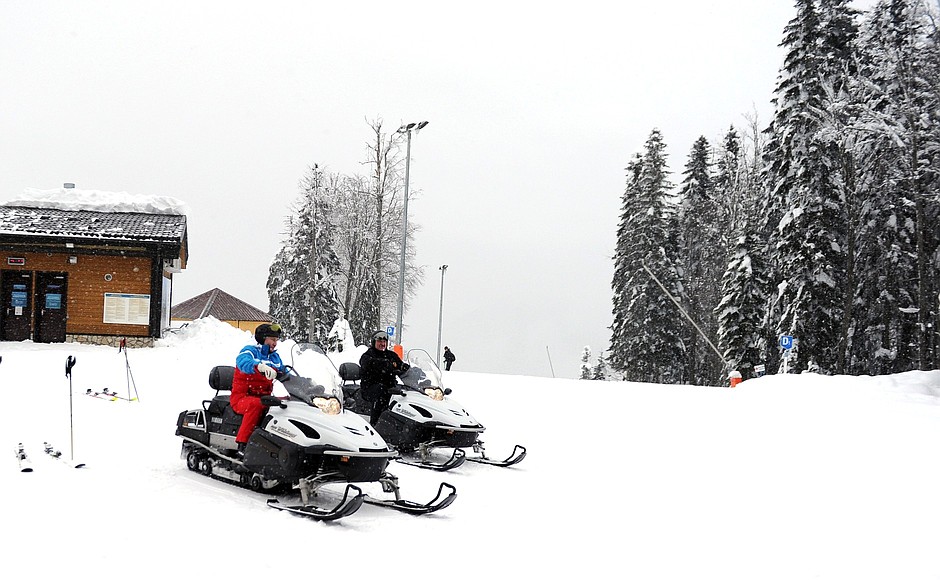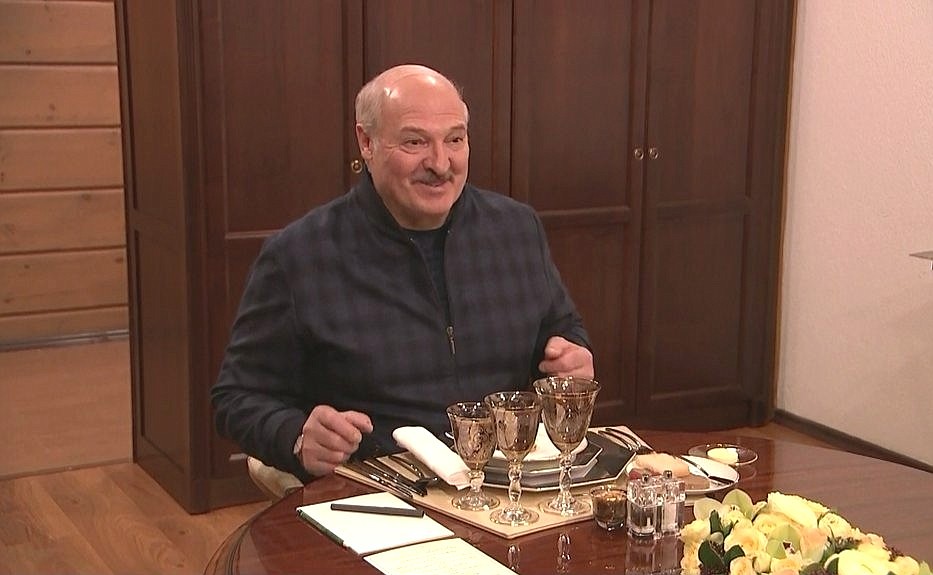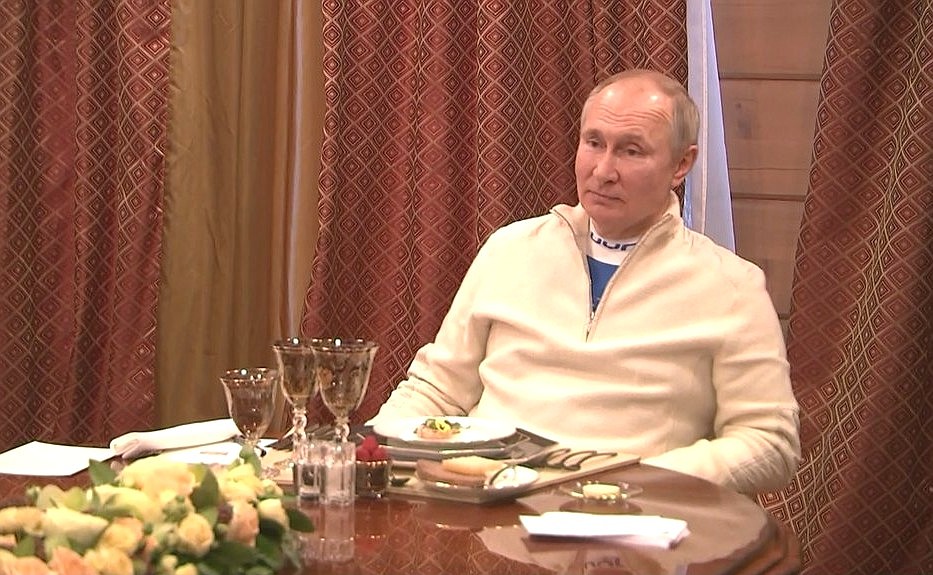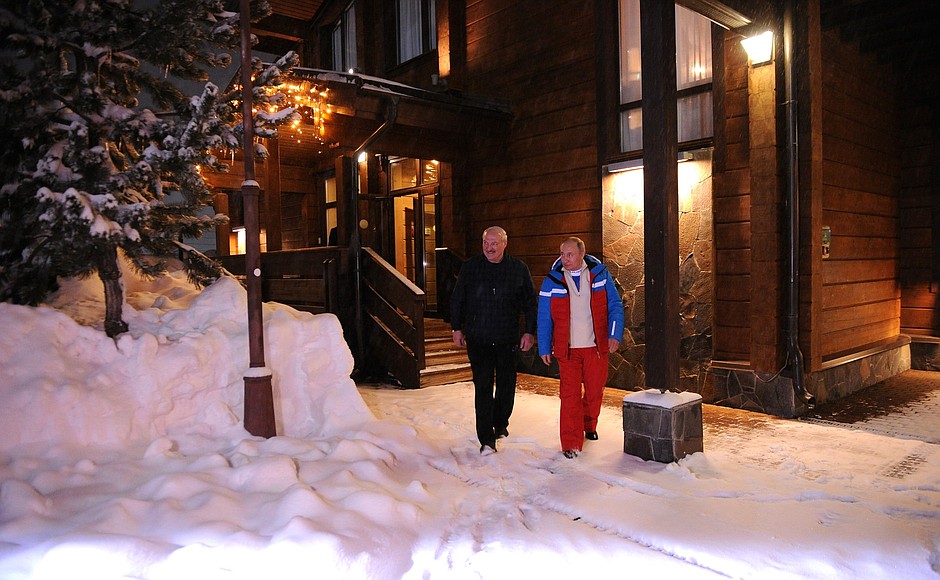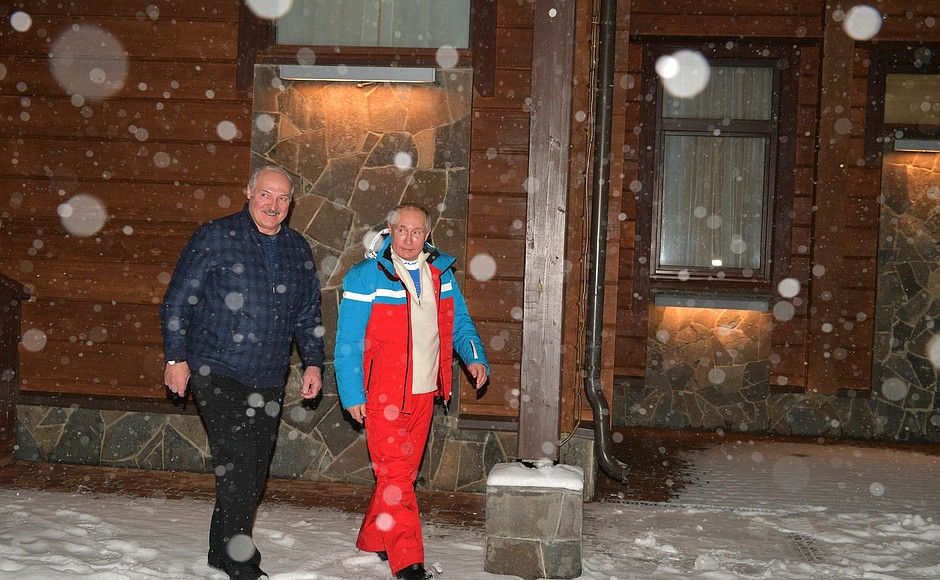President of Russia Vladimir Putin: Mr Lukashenko,
I am very happy to meet with you again in person, which is rare and very valuable under the present circumstances.
Our interaction tools have been running smoothly. We do not have a single day when our colleagues do not speak to each other or resolve some particular issues that face them.
But I am pleased to say that the level of interaction in our strategic partnership and alliance is being reaffirmed. Russia remains Belarus’ biggest trade and economic partner at about 50 percent. We are the largest investor: your Russian partners have invested over $4 billion in the Belarusian economy.
We are pursuing large projects in energy. Suffice it to mention the Belarusian Nuclear Power Plant, which, as we know, is being successfully implemented. I would like to highlight that the President of Belarus is personally focused on this major project.
We are also working hard in our traditional markets, including agriculture. Foodstuffs from Belarus enjoy great popularity in Russia as they are invariably of high quality and normally fresh and affordable.
Of course, we have strong relations in culture. There is actually no need to list our contacts. We are a very close as people and nations. Culture, language, religion, a shared history which is rooted not only in the fairly recent and heroic past during the Great Patriotic War, but also goes back centuries, this is what unites us. And it is good that we are encouraging these efforts today as well.
I am happy to note that many young people in Belarus choose Russian universities and colleges to study for their careers and get a good profession.
And lastly, interaction at the regional level. Each year we hold meetings with the leaders of the regional administration bodies. This work is crucial because the bulk of our relations has been built up and continues to be built up at the level of regional interaction. This includes economic ties and personal relations. These fairly extensive ties are proceeding in the border regions exactly in this way – from person to person, from one family to another.
We have a lot of work on today’s agenda.
I am very glad to see you. Welcome.
I hope we will be able to spend at least some time together and relax after today’s working hours, and I would like to invite you to do some skiing.
President of the Republic of Belarus Alexander Lukashenko: Thank you, Mr Putin.
You said the key phrase at the beginning, that it is indeed rare that heads of state meet and speak privately these days. I think we will keep this communication format running.
Even our appearance – clothes and other things, serious talks in casual clothes – shows that we are close. Our peoples are very close as well as our countries, so we can discuss serious issues in any form.
There is no need to invent anything – you and I have done a lot, and our governments have been working together up until now. I think we have identified 33 areas; you remember the roadmaps we worked out. During our first meeting in Sochi, we agreed to upgrade and modernise these roadmaps, and our governments would work on this.
The governments did indeed do very much, both the Russian and the Belarusian governments. They upgraded the format, and Ambassador Semashko reported to me today that six or seven roadmaps remain of the 33 that our governments are working on. These new roadmaps have different names now after rebranding. Most are ready to be signed< so we have a plan.
I am definitely very grateful to you for the support you have given to the Belarusian economy. I should say that this has been done for a good reason, it is not a waste of money. Belarus has a GDP of about $70 billion, and as you said, about half of our foreign trade is tied with Russia. We are Russia’s number four partner in terms of trade. It seems like an average European country, yet it ranks fourth for giant Russia. So, you can imagine how much raw materials and component parts from Russia we use in our $70 billion GDP.
This is why I am thanking you. You should know that you have not frittered your money away. We invest in back-end production thus purchasing a tremendous amount of component parts and raw materials from Russia, and that amount is ever growing.
If we implement all the planned projects that we have approved for the coming five years, imports form the Russian Federation will increase dramatically. Even though we will commission a nuclear power plant, which would mean five billion less in natural gas purchasing, we are set to build the Grodno nitrogen fertiliser complex, which also means natural gas consumption; this is why we could still increase gas consumption.
Vladimir Putin: One billion more.
Alexander Lukashenko: Even slightly more than that.
The new complex is estimated at $1.2 billion to $1.3 billion. We have experience in this area with a similar plant, and it works for us; this is why we want to increase the output of nitrogen fertilisers. We are ready to implement this project with Gazprom if you give the instructions.
Thank you very much for access to education and universities. Although we have a good level of education, young people proactively apply to universities in the Russian Federation to secure a good education. I have one such young man in my family, as you know.
We often discuss the coronavirus issue and your achievements. I keep saying we also have some achievements in vaccine production since Soviet times. But you already have three registered vaccines and more in development. We are also on this track: we will have our vaccine by the autumn, we have specialists for that, but currently we are purchasing yours.
At home we often say the subject of vaccines testifies to the highest level of science in the Russian Federation. But science does not exist without proper education. This has had a powerful effect on our youth in terms of education in the Russian Federation. Meanwhile, young people from Russia also come to us; thank God, we have no barriers here.
Thank you for responding to my request and reopening rail traffic between our countries, increasing air traffic and making it possible for citizens of both Russia and Belarus to travel back and forth. I think soon we will also reopen automobile traffic.
We have few problems with this; we are not closed in this respect. Under our agreement, you sent in sent specialists, and they found that the morbidity rates in our two countries were almost identical. Luckily, the morbidity has begun to drop. We hope by autumn or even by summer we will approach a zero rate.
I am very grateful for the invitation, for a chance to be able to come to the mountains, even if only for a short time, and breathe fresh air in these tumultuous times. Thank you.
Vladimir Putin: You mentioned financial support. You are absolutely right; this is crucial but it is not the main thing. The key is working together and cooperating in the real sector of the economy. Trade has indeed fallen somewhat during the epidemic, by about 15 percent. Nevertheless, it totalled $28.5 billion, which is a pretty big number, a considerable amount.
As to our joint efforts on fighting the coronavirus, this is progressing successfully. We delivered the first batch last year, and the next deliveries are due in February and March. But most importantly, in my view, is that we are launching it at your company…
Alexander Lukashenko: We began production with your technology in March.
Vladimir Putin: Absolutely correct. What is important is that the technology has been transferred. So far, we have not closely cooperated this much with anyone…
Alexander Lukashenko: It is substantial support. Without it, we would have had trouble with vaccination.
We have already vaccinated almost all doctors, and now we are vaccinating teachers and retail workers – those who have the most contact with people. This is why it is such substantial support.
Vladimir Putin: And the overall result is, to put it modestly, satisfactory. According to an objective indicator, we recently had 12 new cases a day per 100,000 people whereas now the number is smaller, I believe, around 10.
Alexander Lukashenko: The Russian vaccine is the most efficient one; it is acknowledged throughout the world. It is the most efficient vaccine, no matter how they troll and dig at it.
Vladimir Putin: This is true.
Alexander Lukashenko: Two or three people of every hundred of those vaccinated can experience a mild illness. We had one person, I will not mention his name, who fell ill after being vaccinated with the Russian vaccine. He was sick for a day and a half altogether.
Vladimir Putin: Right.
Alexander Lukashenko: There was just one case.
Vladimir Putin: It comes as a mild infection.
But I meant to say that we have about 10 new daily cases per 100,000…
Alexander Lukashenko: That is very little.
Vladimir Putin: Whereas in the south of France there are over 70 cases per 100,000 people. This is a disturbing number.
Alexander Lukashenko: Of course.
Vladimir Putin: You see, this is objective data, which says that we should join efforts with our European colleagues, among others. We are trying to do that; we are open to cooperation. Our Gamaleya Centre has a contract with AstraZeneca. I am pleased to note that we will be joining efforts with our European partners as well, we will be working together.
And with Belarus – that goes without saying. Let me repeat, the technology has already been transferred, and according to the reports I receive, production is being rolled out.
Alexander Lukashenko: You promised that Belarus would be the first country, and you did this.
Vladimir Putin: And it happened like that.
Alexander Lukashenko: Thank you for this.
<…>
